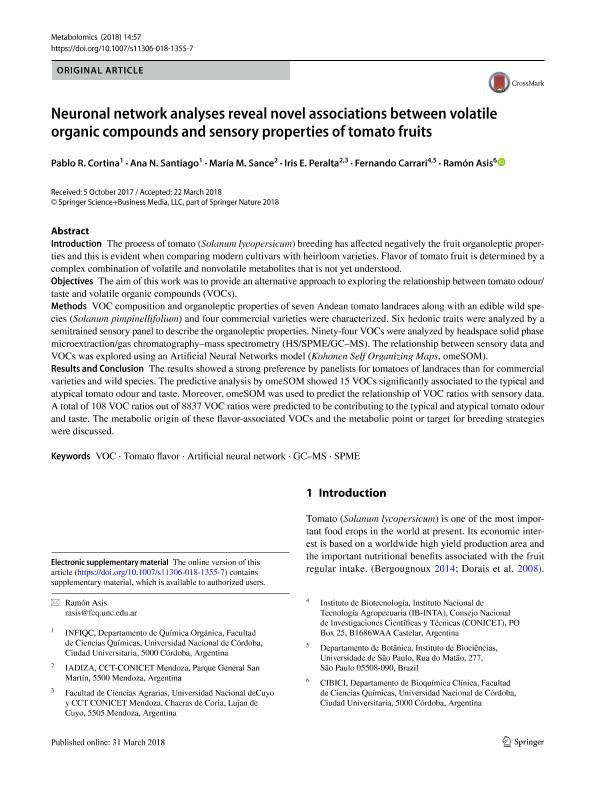Mostrar el registro sencillo del ítem
dc.contributor.author
Cortina, Pablo Ramiro

dc.contributor.author
Santiago, Ana Noemi

dc.contributor.author
Sance, Maria Mirta

dc.contributor.author
Peralta, Iris Edith

dc.contributor.author
Carrari, Fernando Oscar

dc.contributor.author
Asis, Ramón

dc.date.available
2019-10-01T15:10:16Z
dc.date.issued
2018-05
dc.identifier.citation
Cortina, Pablo Ramiro; Santiago, Ana Noemi; Sance, Maria Mirta; Peralta, Iris Edith; Carrari, Fernando Oscar; et al.; Neuronal network analyses reveal novel associations between volatile organic compounds and sensory properties of tomato fruits; Springer; Metabolomics; 14; 5; 5-2018
dc.identifier.issn
1573-3882
dc.identifier.uri
http://hdl.handle.net/11336/84911
dc.description.abstract
The process of tomato (Solanum lycopersicum) breeding has affected negatively the fruit organoleptic properties and this is evident when comparing modern cultivars with heirloom varieties. Flavor of tomato fruit is determined by a complex combination of volatile and nonvolatile metabolites that is not yet understood. Objectives: The aim of this work was to provide an alternative approach to exploring the relationship between tomato odour/taste and volatile organic compounds (VOCs). VOC composition and organoleptic properties of seven Andean tomato landraces along with an edible wild species (Solanum pimpinellifolium) and four commercial varieties were characterized. Six hedonic traits were analyzed by a semitrained sensory panel to describe the organoleptic properties. Ninety-four VOCs were analyzed by headspace solid phase microextraction/gas chromatography–mass spectrometry (HS/SPME/GC–MS). The relationship between sensory data and VOCs was explored using an Artificial Neural Networks model (Kohonen Self Organizing Maps, omeSOM). The results showed a strong preference by panelists for tomatoes of landraces than for commercial varieties and wild species. The predictive analysis by omeSOM showed 15 VOCs significantly associated to the typical and atypical tomato odour and taste. Moreover, omeSOM was used to predict the relationship of VOC ratios with sensory data. A total of 108 VOC ratios out of 8837 VOC ratios were predicted to be contributing to the typical and atypical tomato odour and taste. The metabolic origin of these flavor-associated VOCs and the metabolic point or target for breeding strategies were discussed.
dc.format
application/pdf
dc.language.iso
eng
dc.publisher
Springer

dc.rights
info:eu-repo/semantics/openAccess
dc.rights.uri
https://creativecommons.org/licenses/by-nc-sa/2.5/ar/
dc.subject
ARTIFICIAL NEURAL NETWORK
dc.subject
GC–MS
dc.subject
SPME
dc.subject
TOMATO FLAVOR
dc.subject
VOC
dc.subject.classification
Bioquímica y Biología Molecular

dc.subject.classification
Ciencias Biológicas

dc.subject.classification
CIENCIAS NATURALES Y EXACTAS

dc.title
Neuronal network analyses reveal novel associations between volatile organic compounds and sensory properties of tomato fruits
dc.type
info:eu-repo/semantics/article
dc.type
info:ar-repo/semantics/artículo
dc.type
info:eu-repo/semantics/publishedVersion
dc.date.updated
2019-09-30T18:27:36Z
dc.journal.volume
14
dc.journal.number
5
dc.journal.pais
Alemania

dc.description.fil
Fil: Cortina, Pablo Ramiro. Consejo Nacional de Investigaciones Científicas y Técnicas. Centro Científico Tecnológico Conicet - Córdoba. Instituto de Investigaciones en Físico-química de Córdoba. Universidad Nacional de Córdoba. Facultad de Ciencias Químicas. Instituto de Investigaciones en Físico-química de Córdoba; Argentina
dc.description.fil
Fil: Santiago, Ana Noemi. Consejo Nacional de Investigaciones Científicas y Técnicas. Centro Científico Tecnológico Conicet - Córdoba. Instituto de Investigaciones en Físico-química de Córdoba. Universidad Nacional de Córdoba. Facultad de Ciencias Químicas. Instituto de Investigaciones en Físico-química de Córdoba; Argentina
dc.description.fil
Fil: Sance, Maria Mirta. Universidad Nacional de Cuyo. Facultad de Ciencias Agrarias; Argentina. Consejo Nacional de Investigaciones Científicas y Técnicas; Argentina
dc.description.fil
Fil: Peralta, Iris Edith. Consejo Nacional de Investigaciones Científicas y Técnicas; Argentina. Universidad Nacional de Cuyo. Facultad de Ciencias Agrarias; Argentina
dc.description.fil
Fil: Carrari, Fernando Oscar. Consejo Nacional de Investigaciones Científicas y Técnicas; Argentina. Instituto Nacional de Tecnología Agropecuaria. Centro de Investigación en Ciencias Veterinarias y Agronómicas. Instituto de Biotecnología; Argentina
dc.description.fil
Fil: Asis, Ramón. Consejo Nacional de Investigaciones Científicas y Técnicas. Centro Científico Tecnológico Córdoba. Centro de Investigaciones en Bioquímica Clínica e Inmunología; Argentina
dc.journal.title
Metabolomics

dc.relation.alternativeid
info:eu-repo/semantics/altIdentifier/url/http://link.springer.com/10.1007/s11306-018-1355-7
dc.relation.alternativeid
info:eu-repo/semantics/altIdentifier/doi/https://doi.org/10.1007/s11306-018-1355-7
Archivos asociados
